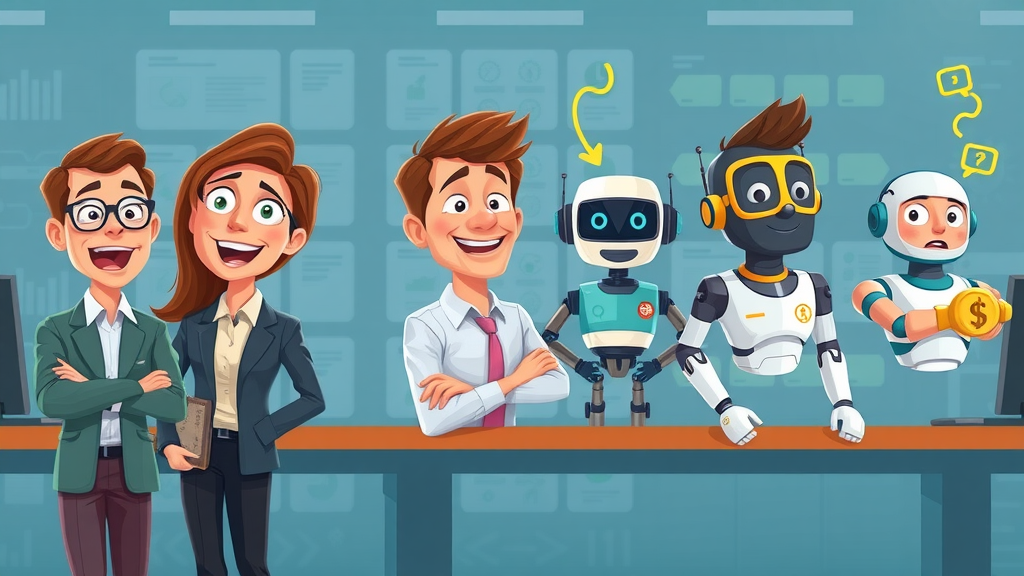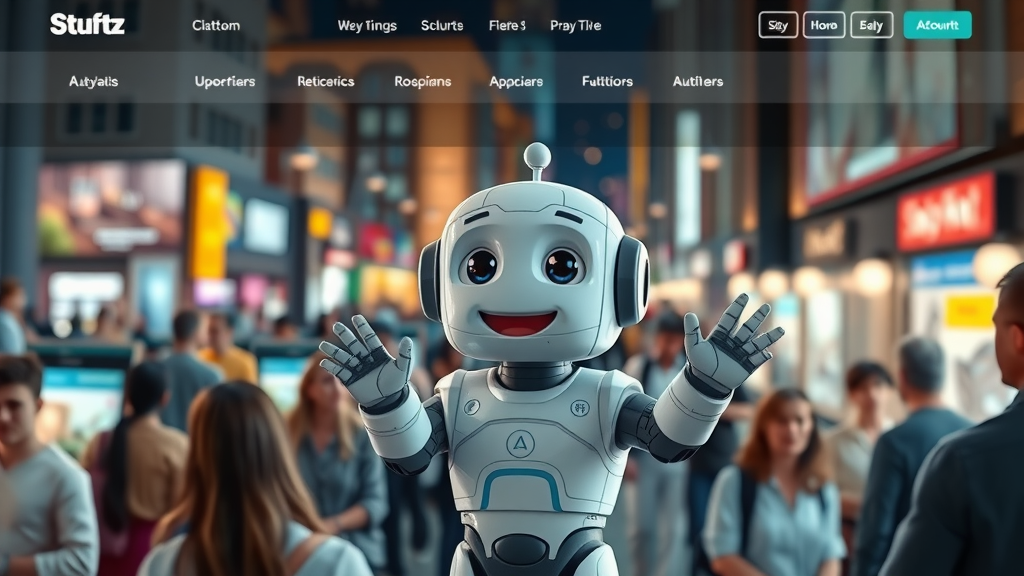Imagine this: Your website never sleeps – and neither does your ai chatbot to qualify leads. While you’re off the clock, your digital receptionist is booking meetings, qualifying leads, and capturing every opportunity that visits your site. In fact, businesses using AI chatbots for lead qualification see up to a 40% boost in their efficiency, turning night-time site visitors into qualified leads that your competitors might be missing. Want in on this game-changing strategy? Welcome to your go-to guide tailored for local property service business owners looking to modernise lead generation and stay ahead.

AI Chatbot to Qualify Leads: A Groundbreaking Solution for Lead Generation
The rise of ai chatbots to qualify leads has completely transformed how property services businesses engage website visitors and capture potential customers—day or night. No longer are you tied to office hours or manual, inconsistent lead follow-up systems. Instead, an ai chatbot can interact with interested prospects on your lead generation website 24/7, asking qualifying questions, booking meetings, and immediately funnelling the most promising leads to your sales or marketing team.
This digital shift ensures every visitor has a seamless chat experience from their first click to the moment they book a viewing. Unlike traditional phone-based reception or slow follow-ups via email, AI chatbots deliver instant responses to every site visitor’s enquiry. By adopting this technology, property services can benefit from higher lead capture, faster response times, and ultimately, a significant bump in conversion rates. For any business that wants to build a lead pipeline that’s always open, AI-powered lead qualification is more than a trend—it’s a must-have solution for staying competitive and relevant in today’s digital-first world.
Did you know? Businesses that use AI chatbots to qualify leads see up to a 40% increase in lead qualification efficiency – transforming night-time website traffic into valuable opportunities.
What You’ll Learn
- How an AI chatbot to qualify leads supports local property services
- Best practices and strategies for deploying an ai chatbot
- Comparisons between leading lead generation chatbot solutions
- Step-by-step guide for integrating ai chat into your website
- Case studies: Real-world impact on local businesses
Understanding Lead Generation, Lead Qualification & the Role of an AI Chatbot to Qualify Leads

What Is Lead Generation and Why Local Property Services Need It
In the world of property services, lead generation means attracting and capturing people interested in buying, selling, or renting properties. For local agencies, this typically involves a mix of online and offline tactics—everything from digital ads and social media to open houses and mailers. But as the industry moves increasingly online, your website quickly becomes the front door to your business for many potential customers.
Having a reliable system to capture leads from website visitors is crucial. Without it, hot prospects might browse and leave, never returning. With ai chatbots now available, agencies can greet visitors instantly, answer questions, and start capturing essential contact details—even when the office is closed. This sets the stage for your sales team or marketing teams to nurture prospects, book meetings, and ultimately turn website browsers into buyers or tenants. Today, getting your lead gen funnel right means having both the right digital touchpoints and a smart system to harness every opportunity, day or night.
What Is Lead Qualification & How an AI Chatbot to Qualify Leads Automates the Process
Lead qualification is all about spotting who’s serious from who’s just browsing. In property services, this usually means sorting those ready to view or transact from casual site visitors. Traditionally, this job fell to your sales rep or front desk. But now, your ai chatbot to qualify leads can ask the right questions—like “Are you looking to buy, sell, or rent?” or “What’s your preferred viewing time?”—and automatically assign a lead score based on responses.
By automating this process, you don’t miss out on high-intent prospects, even outside normal working hours. AI agents handle repetitive lead capture and sorting tasks, freeing your team to focus on nurturing only the strongest candidates. With the help of generation chatbots, you can streamline follow-ups, reduce manual admin, and ensure your business never lets a top lead slip by.
From Site Visitors to Qualified Leads: The Evolution of Lead Gen Chatbots

Ten years ago, website lead generation was largely manual. Visitors filled out forms, waited for a follow-up, and often dropped off before the sales team could get in touch. Early chatbots helped with simple greetings, but lacked smart personalisation. Today’s generation chatbots have evolved, using natural conversation and smart algorithms to engage each visitor, gather details in real time, and apply lead qualification criteria automatically.
Modern ai chatbots don’t just chat - they guide, qualify, book meetings, and even sync directly with your CRM and scheduling tools. This evolution means that you can now count on night-time or early-morning website traffic to result in actionable, high-quality leads. As the technology keeps improving, the future of lead generation will only get smarter, more personal, and more effective for local agencies.
Why Choose an AI Chatbot to Qualify Leads for Property Services
24/7 Engagement with Website Visitors Using an AI Chatbot
One of the standout benefits for property services is the ability to have a 24/7 virtual receptionist via an ai chatbot to qualify leads. Unlike human staff, AI chatbots never take breaks or miss messages from site visitors. No matter the hour, anyone visiting your website is immediately welcomed and engaged—whether it’s a late-night buyer searching for homes or a landlord looking to list their property after work.
Data shows that property inquiries surge after office hours, so failing to respond right away could mean missing the chance to connect. With an AI chatbot, local agencies can maximise every opportunity, ensuring site visitors always have their questions answered, and their intent captured, without delay.
Book Meetings, Capture Qualified Leads, and Reduce Response Time

Speed is everything in real estate. When a prospect is ready, booking a meeting or property viewing fast could make all the difference. Lead generation chatbots can instantly schedule appointments, collect contact information, and alert your sales teams or marketing teams—shrinking the response time from hours to seconds.
Beyond speed, AI chatbots ensure you capture only qualified leads. By asking the right screening questions, the system weeds out unfit prospects and pushes only the most promising to the next step. This approach raises your conversion rate, improves team productivity, and ensures valuable time isn’t wasted on cold or irrelevant enquiries.
Best Practices for Deploying Chatbots for Lead Generation
To get the best results from your ai chatbot to qualify leads, consider the following best practices: First, personalise your chatbot prompts for the property industry, referencing local market terminology and common questions from your site visitors. Secondly, set up your AI to proactively guide users towards booking meetings or sharing relevant details, rather than waiting for them to initiate. Lastly, ensure frequent updates and reviews of your chatbot’s conversation flows, so it learns from past interactions and remains aligned with your sales and lead qualification objectives.
By following these best practices, you can turn your generation chatbot into a seamless extension of your marketing automation strategy—gathering data, nurturing prospects, and always ready for the next step in the property services journey.
| Feature | Manual Qualification | AI Chatbot Qualification |
|---|---|---|
| 24/7 Availability | No | Yes |
| Response Speed | Slower | Instant |
| Consistency | Variable | High |
| Human Resource Needed | High | Low |
| Cost Efficiency | Low | High |
How to Set Up an AI Chatbot to Qualify Leads on Your Website
- Identify the Best AI Chatbots for Lead Generation for Your Business
- Define Lead Generation and Lead Qualification Criteria
- Integrate the Generation Chatbot with Your Website
- Craft Custom AI Chatbot Conversation Flows
- Train and Optimise Your AI Agent for Local Market
- Monitor Performance and Adjust

Choosing the Right AI Chatbot Provider: Lead Generation Chatbots to Consider
With plenty of lead generation chatbots on the market, choosing the right one for your specific property agency needs is key. Consider solutions with native support for your website platform (like WordPress, Wix, or Squarespace), built-in lead scoring, real-time appointment booking, and CRM integrations. The best chatbots make it easy to build a lead journey from start to finish, optimising every step from site visitor engagement to qualified lead capture.
Think about your current workflow and tools like CRM, email marketing, or scheduling software you already use. Opt for chatbots that connect seamlessly and can adapt conversations for the local property market—making every interaction feel relevant and personal.
| Chatbot Name | Key Features | Integrations | Pricing |
|---|---|---|---|
| ChatbotX | Lead scoring, booking, CRM | WordPress, Zapier | $$ |
| LeadBotPro | Property-specific templates | Wix, HubSpot | $ |
| GenieBot | AI agents, analytics dashboard | Squarespace | $$$ |
Step-by-Step: Building a Lead Gen Chatbot Journey for Property Services
Step 1: Mapping Out Your Ideal Lead Generation and Qualification Flow
Before launching your generation chatbot, map out the ideal path a site visitor should take—from first greeting through to becoming a qualified lead. Start by listing the key qualification questions you want asked (e.g., “Are you ready to view right now or in the future?”). Then, decide what details you need to collect (contact info, property interests, timeframe) and where high-intent users should be prompted to book meetings or receive a callback.
Next, sketch out common conversation scenarios, from first-time buyers to landlords. This will help ensure your ai chatbot to qualify leads is ready for the real-world variety of site visitors in your local market. The more you customise the chatbot flow to your target audience, the better your conversion rate and lead qualification results will be.
Step 2: Automating Lead Scoring and Booking Meetings

Lead scoring is crucial for sorting prospects by their readiness to transact. Your ai agent will ask targeted questions and automatically assign a score based on predefined criteria—such as budget, timeline, and property need. Higher scores indicate a more qualified lead ready for immediate action.
Simultaneously, the chatbot can trigger automated actions like booking meetings or property viewings, sending instant notifications to your sales team, and syncing details with your CRM. This automation ensures all steps happen in real time for truly responsive lead gen.
Step 3: Integrating Your Generation Chatbot with CRM and Scheduling Tools
Seamless integration with your CRM (such as HubSpot, Salesforce) and scheduling tools (like Calendly) is essential for maximising the benefits of your lead generation chatbot. With direct integrations, all lead data is automatically logged, removing manual entry and allowing your marketing teams to pursue follow-ups or nurture campaigns instantly.
Choose generation chatbots with an open API or native support for tools you already use. Regularly review the integration setup to ensure data flows accurately from the chatbot into your business systems—helping your local property services stay agile, data-driven, and ready for the next step.
AI Chatbot to Qualify Leads: Data Security & Compliance Considerations

Handling Personal Data of Site Visitors with a Lead Gen Chatbot
Data protection is a top priority when capturing leads through your website. Your ai chatbot to qualify leads should always make it clear what personal information is being collected, how it will be used, and ensure all data transmission is encrypted. Position privacy notices up front in the chatbot dialog and obtain user consent before collecting sensitive information.
Work closely with your marketing automation provider to regularly audit chatbot flows for security gaps. Choose chatbots with built-in compliance and encryption, so your site visitors trust the process—and your business avoids regulatory pitfalls, especially important with GDPR and UK data laws.
Compliant Lead Capture for UK Property Services
To remain compliant, your chatbot must only collect information that is necessary for lead qualification and ensure that storage complies with GDPR principles. Avoid collecting superfluous data, always offer an easy opt-out, and provide reassurance that all details will be handled responsibly. For UK property services, this approach safeguards both your brand reputation and customer trust.
Adopting these careful practices means your generation chatbot delivers both powerful results and the highest standards of compliance for your local market.
How to Use AI to Qualify Leads? (People Also Ask)
Answer: AI chatbots to qualify leads work by engaging website visitors through targeted questions, collecting user information, analysing responses using lead scoring algorithms and qualifying leads for follow-up or booking meetings automatically.
How Do Chatbots Qualify Leads? (People Also Ask)
Answer: Chatbots qualify leads by asking specific, pre-set qualification questions, assessing responses in real-time and applying criteria to sort high-intent leads from casual browsers.
Can AI Help Generate Leads? (People Also Ask)

Answer: AI can help generate leads by automating conversation, capturing contact information, booking meetings, and nurturing prospects around the clock with adaptive, personalised engagement.
Which Chatbot is Best for Lead Generation? (People Also Ask)
Answer: The best chatbot for lead generation depends on business needs, but popular options include Intercom, Drift, HubSpot Chatbot, and custom solutions tailored for the property services sector.
AI Chatbot to Qualify Leads: Best Practices for Implementation
- Use property-specific language for local site visitors
- Prompt booking actions at the right time
- Regularly review and optimise AI chatbot flows
- Integrate seamlessly with local business software
- Prioritise security and compliance, especially for user data
Case Study: Increasing Qualified Leads for a Local Estate Agency with an AI Chatbot

"Our AI chatbot to qualify leads not only doubled our night-time inquiries but also ensured every lead received instant responses — we’ve seen a marked rise in actual booked viewings." – Local Estate Agency Owner
FAQs: AI Chatbot to Qualify Leads and Lead Generation Chatbots
- What information should an AI chatbot collect to qualify leads? An AI chatbot should collect name, contact information, property needs (buying, selling, renting), budget, timeframe, and preferred locations to ensure the lead is properly qualified for follow-up.
- How quickly should an AI chatbot respond to site visitors? Ideally, AI chatbots should respond instantly—within seconds of a visitor’s query—to maximise engagement and reduce risk of drop-off.
- Can an AI chatbot replace a human receptionist? While not a full replacement, AI chatbots can handle high-volume, repetitive qualification, freeing human staff to focus on complex queries and relationship building.
- How do I measure the performance of my lead generation chatbot? Track metrics such as number of leads captured, qualification rates, meeting bookings, response time, and conversion to sales to gauge success.
Key Takeaways: Transform Your Lead Gen with an AI Chatbot to Qualify Leads
- AI chatbots to qualify leads drive 24/7 engagement and conversion from website visitors.
- Local property services benefit from increased efficiency and better qualified leads.
- Adopting best practices leads to consistent, scalable lead generation results.
Conclusion: Getting Started with an AI Chatbot to Qualify Leads
Ready to see how an AI chatbot to qualify leads can change your local property services business?
The next step is simple: embrace the future of lead generation, empower your team, and never miss a qualified lead again.
Discover more about putting AI to work in your business - contact us at AI@dylbo.com
To enhance your understanding of implementing AI chatbots for lead qualification, consider exploring the following resources:
-
“I tested Social Intents - read what I found with this impressive help desk solution”: This review delves into Social Intents, a platform that integrates live chat and AI-powered chatbots with tools like Microsoft Teams and Slack. It highlights features such as proactive chat triggers, customer segmentation, and real-time auto-translation, offering insights into how these capabilities can streamline lead qualification processes. (techradar.com)
-
“I tested Tidio, a live chat platform with AI chatbot features, all for a bargain price”: This article reviews Tidio, an all-in-one customer service platform that combines live chat, AI chatbots, and multichannel messaging. It discusses the platform’s user-friendly interface, quick website integration, and features like visitor tracking and advanced analytics, providing a comprehensive overview of how Tidio can enhance lead qualification efforts. (techradar.com)
These resources offer practical insights into selecting and implementing AI chatbots to effectively qualify leads, ensuring your website engages visitors around the clock and captures valuable opportunities.
 Add Row
Add Row  Add
Add 










Write A Comment